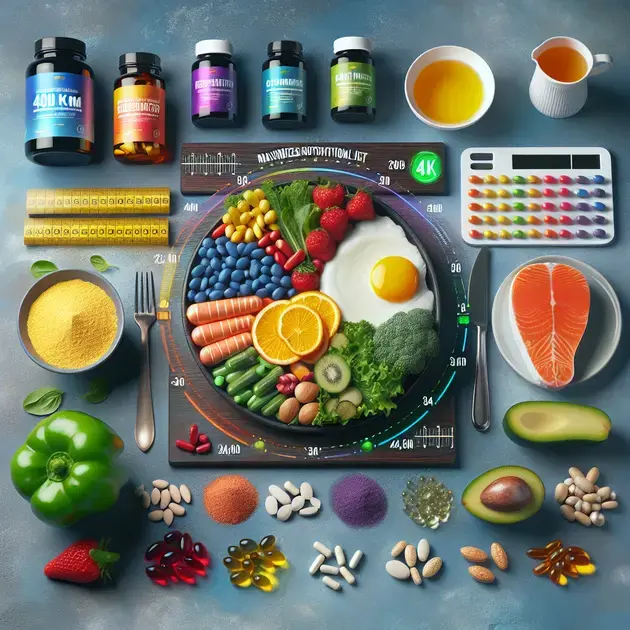Are you looking to discover the top dietary supplements for optimal health? In the ever-evolving world of nutrition, it can be challenging to navigate through the vast array of options available on the market today.
With new trends constantly emerging, it’s essential to stay informed about the latest research and developments in the field of dietary supplements. By understanding the key nutrients that can support your overall well-being, you can make informed choices that align with your health goals.

Top Dietary Supplements for a Healthy Lifestyle
Dietary supplements can be a valuable addition to your daily routine, providing essential nutrients that may be lacking in your diet. When choosing the best supplements for a healthy lifestyle, it’s important to consider your individual needs and consult with a healthcare professional. Here is a step-by-step guide to finding the top dietary supplements:
1. Identify Your Nutritional Needs
Before selecting any supplements, assess your current diet and lifestyle to determine which nutrients you may be lacking. You can use apps like MyFitnessPal or Cronometer to track your daily intake and identify any deficiencies.
2. Research Top-Rated Brands
Once you know which nutrients you need to supplement, research top-rated brands known for their quality and effectiveness. Websites like ConsumerLab or Labdoor offer independent reviews and ratings of various supplement brands.
3. Check for Certifications
Look for supplements that have been tested and certified by third-party organizations such as NSF International or USP. These certifications ensure that the products meet high standards of purity and potency.
4. Consider Your Budget
While quality is important, also consider your budget when choosing dietary supplements. Compare prices across different brands and retailers to find options that fit your financial constraints without compromising on quality.
5. Monitor Your Progress
After incorporating dietary supplements into your routine, monitor your progress and consult with a healthcare provider regularly. Track any changes in your health or well-being to assess the effectiveness of the supplements you’re taking.
Unlocking the Benefits of Key Nutrients
Key nutrients play a crucial role in supporting overall health and well-being. By ensuring you get an adequate intake of essential vitamins and minerals, you can unlock a wide range of benefits for your body. Here’s how you can optimize the benefits of key nutrients:
1. Focus on a Balanced Diet
The foundation of unlocking the benefits of key nutrients is a balanced diet rich in fruits, vegetables, whole grains, and lean proteins. Apps like MyPlate or EatThisMuch can help you plan meals that are nutrient-dense and varied.
2. Prioritize Absorption
Avoid nutrient interactions that can hinder absorption. For example, taking calcium and iron supplements together can reduce the absorption of both minerals. Keep track of these interactions using tools like the Supplement-Drug Interactions Checker from Medscape.
3. Customize Your Supplement Regimen
Consider personalized nutrition plans or DNA testing services like Nutrigenomix to identify specific nutrient needs based on your genetic profile. This can help tailor your supplement regimen to your unique requirements.
4. Stay Hydrated
Hydration is essential for nutrient absorption and overall health. Apps like Plant Nanny or WaterMinder can help you track your daily water intake and ensure you stay well-hydrated to maximize the benefits of key nutrients.
5. Get Regular Health Check-Ups
Regular health check-ups can help you monitor your nutrient levels and make adjustments to your supplement regimen as needed. Use platforms like Zocdoc or Healthgrades to find healthcare providers for routine check-ups and blood tests.

**Key Ingredients for a Balanced Diet**
In order to maintain a balanced diet, it is essential to incorporate a variety of key ingredients into your daily meals. These ingredients provide the necessary nutrients that our bodies need to function properly and stay healthy. Some of the key ingredients for a balanced diet include fruits and vegetables, whole grains, lean proteins, and healthy fats.
Fruits and vegetables are rich in vitamins, minerals, and antioxidants that are important for overall health. It is recommended to consume a variety of colors to ensure you are getting a wide range of nutrients. Whole grains, such as brown rice, quinoa, and oats, are a great source of fiber, which can help regulate digestion and keep you feeling full for longer periods of time.
Lean proteins, such as chicken, turkey, fish, and tofu, are essential for building and repairing tissues in the body. They also help to keep you feeling satisfied and energized throughout the day. Healthy fats, like avocados, nuts, and olive oil, are important for brain function and cardiovascular health.
Step-by-step guide:
1. Incorporate a variety of fruits and vegetables into your meals
2. Choose whole grains over refined grains whenever possible
3. Include lean proteins in your diet, such as poultry, fish, and plant-based sources like tofu
4. Incorporate healthy fats into your meals, like avocados, nuts, and olive oil
5. Stay hydrated by drinking plenty of water throughout the day
**Maximizing Nutritional Intake**
Maximizing nutritional intake is crucial for ensuring that your body is receiving all the essential nutrients it needs to function at its best. By consuming a variety of nutrient-dense foods, you can optimize your health and well-being. Some ways to maximize your nutritional intake include focusing on whole, unprocessed foods, eating a rainbow of fruits and vegetables, and incorporating lean proteins into your meals.
Whole, unprocessed foods are packed with essential nutrients like vitamins, minerals, and antioxidants. These foods are also rich in fiber, which can help with digestion and keep you feeling full. By choosing these foods over processed options, you can ensure that you are getting the most nutrition out of your meals.
Eating a variety of fruits and vegetables in different colors can help you obtain a wide range of vitamins and minerals. Each color represents different phytochemicals that have unique health benefits. By incorporating a rainbow of produce into your diet, you can maximize the nutrients you are consuming.
Step-by-step guide:
1. Focus on whole, unprocessed foods like fruits, vegetables, whole grains, and lean proteins
2. Choose a variety of fruits and vegetables in different colors to maximize your nutrient intake
3. Include lean proteins like poultry, fish, and plant-based sources in your meals
4. Limit processed foods high in added sugars, sodium, and unhealthy fats
5. Stay mindful of portion sizes to ensure you are meeting your nutritional needs while maintaining a healthy weight
**Understanding the Power of Supplements**
Supplements can be a valuable addition to a balanced diet, providing additional nutrients that may be lacking in your regular meals. However, it is important to understand that supplements are meant to complement a healthy diet, not replace it. When used correctly, supplements can help fill in the nutritional gaps and support overall health and well-being.
Some common supplements include vitamins, minerals, probiotics, and omega-3 fatty acids. These supplements can be beneficial for individuals who have specific dietary restrictions, nutrient deficiencies, or certain health conditions. It is always recommended to consult with a healthcare provider before starting any new supplements to ensure they are safe and effective for your individual needs.
It is also important to remember that supplements are not a replacement for a balanced diet. While they can provide additional nutrients, whole foods should always be the foundation of your diet. By combining a variety of nutrient-dense foods with targeted supplements, you can maximize your nutritional intake and support your overall health.
Step-by-step guide:
1. Consult with a healthcare provider before starting any new supplements
2. Choose supplements that address specific nutrient deficiencies or health concerns
3. Use supplements as a complement to a balanced diet, not a replacement
4. Incorporate whole foods rich in essential nutrients into your meals
5. Monitor how your body responds to supplements and adjust your intake as needed
**
Conclusion
**
Understanding the key ingredients for a balanced diet is fundamental for maintaining optimal health. By incorporating a variety of fruits and vegetables rich in vitamins, minerals, and antioxidants, along with whole grains for fiber and lean proteins for tissue repair, one can ensure proper body function and sustained well-being. Healthy fats, such as those found in avocados and nuts, are essential for brain health and cardiovascular well-being. Following a step-by-step guide that emphasizes the importance of these key ingredients, alongside staying hydrated, can significantly enhance your dietary balance and overall health.
Maximizing Nutritional Intake:
Optimizing your nutrition involves focusing on nutrient-dense, unprocessed foods that are brimming with vitamins, minerals, and antioxidants. Consuming a diverse array of fruits and vegetables in various colors allows for a broad spectrum of essential nutrients. Choosing whole foods over processed options not only boosts nutritional intake but also aids digestion and promotes satiety. By following a step-by-step guide that highlights the benefits of whole foods and lean proteins, while avoiding processed foods and being mindful of portion sizes, you can elevate your nutrient consumption, supporting a healthy weight and overall wellness.
Understanding the Power of Supplements:
While supplements can serve as valuable complements to a balanced diet, they should never be viewed as substitutes for whole foods. It is crucial to consult with a healthcare provider before introducing new supplements, selecting those that address specific deficiencies or health concerns. By combining nutrient-dense foods with targeted supplements, individuals can bridge nutritional gaps and enhance overall health. By adhering to a well-rounded dietary approach, incorporating key ingredients, and utilizing supplements judiciously, you can optimize your nutritional intake and support your long-term well-being.